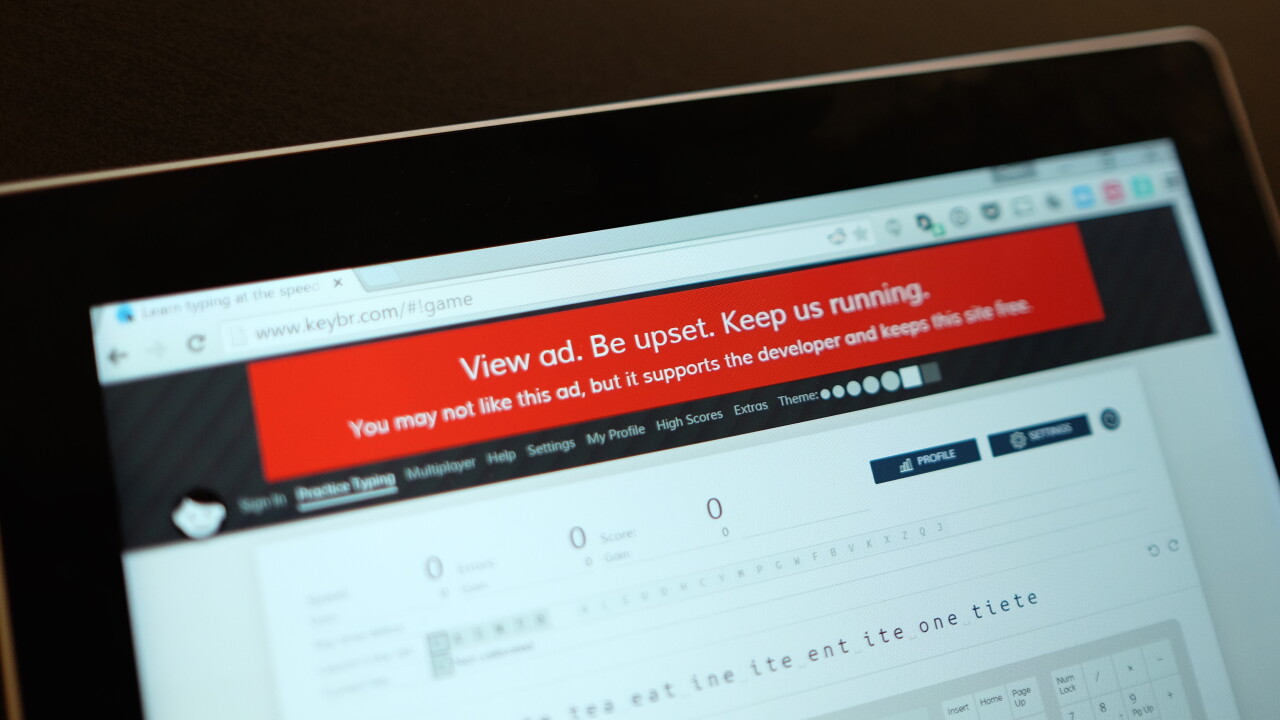
Last week we learned that some European mobile networks plan to block advertising across their services beginning later in 2015.
In response, Editor-in-Chief of The Next Web, Martin Bryant, wrote that ad blocking is “immoral” and that “ad-blocking folk out there are happily starving sites.”
While I agree that blanket ad-blocking is perhaps unfair, I believe some level of ad blocking is a necessity with the internet that exists today.
Before I became a writer I worked in desktop support and later as an infrastructure engineer and could have been described as an ad blocking zealot.
The IT nerd in me wanted everyone to block ads, so I enthusiastically installed it on family and friends’ computers who couldn’t have cared less.
Flawed logic
My viewpoint stemmed from flawed logic that all ads are bad and that they should be blocked for everyone. I’m not sure I ever gave them a chance.
What I learnt as I moved to the publishing world, made friends in it and ultimately changed my way of thinking, was that the practice has a real impact on almost everyone that runs an internet business. From publishers, to social networks, and even those simply trying to start a blog.
That’s when I disabled my blocking extension.
Before I came into this world I’ll admit I didn’t care, but I’d also not ever given advertising any sort of chance. After disabling it, I not only realized it’s not so bad, but found myself very occasionally clicking things.
Here’s the thing: surfing the Web entirely without an ad blocker is dangerous business. It’s easy to claim that ad blocking is immoral, but that’s assuming a perfect world, where there aren’t plenty of malicious parties out there using advertising to deceive and infect users.
There have been plenty of cases of ad networks accidentally (and intentionally) distributing malware or messing with users’ browsers. I eventually re-enabled my ad blocker, but only to protect against this.
The problem isn’t that ad blockers exist — they need to — it’s that by default, they block everything. There needs to be a balance.
Adblockers: install software that makes sure the people whose work you enjoy don't get paid. Always seems parasitic to me.
— Benedict Evans (@BenedictEvans) May 17, 2015
Publishers, social networks and other ad companies simply don’t have a chance, because most people install the extension and don’t bother to tweak the settings.
I eventually went back to using an ad blocker, but instead using it thoughtfully and defensively, giving publishers my trust until they abuse it. I’m using uBlock right now, because it’s the easiest to set up this way.
All you need to do is grab uBlock and head to the “third-party filters” tab in the settings. Un-check everything, except the “malware domain list” and “malware domains” then enable the auto-update feature toward the top.
This way, I’ve got the malware protection that ad-blocking zealots always loudly trumpet whenever the anti-blocking argument comes up. On top of that, I can actively block sites when they abuse that trust with a single click.
Ad tracking, which is another legitimate concern, can also be addressed without removing them entirely. Everyone has the right to not be tracked online and there are plenty of ways to do that without blocking the advertisements themselves.
Simply arguing that publishers should “find another way” isn’t a good enough argument. Everything has a consequence; if everyone blocks advertising, publishing will eventually shift toward a model where almost every site has a paywall.
There are initiatives like Google Contributor where users can pay to remove ads or new entrant Fairblocker, a fork of Adblock Plus, which allows users to pay a small monthly subscription that’s divided between sites visited.
Those ideas are good, but it’s still early days. People don’t pay for news right now.
Balance out of the box
What I’d like to see is an ad-blocking extension that achieves a balance out of the box, banning only networks known to distribute malware. To my knowledge, that doesn’t exist yet, which surprised me when I started looking for one. Maybe I’ll build it.
If you’re blocking every advertisement, you’re stealing from those who rely on them. You’re taking something for free and removing the only way to give back.
I understand if you block ads to protect yourself, like I do, but simply blocking everything is unfair. You’d want to get paid for your work, right?
Consider the consequences your actions have and maybe try using an ad blocker in a way that gives back to those you visit.
Get the TNW newsletter
Get the most important tech news in your inbox each week.






